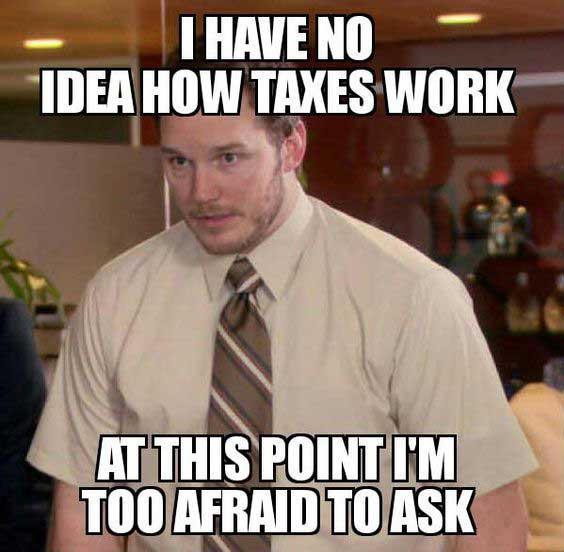All you need to know about filing your Dutch tax return in the Netherlands in 2019 (and why you might need to use the M-form for your ‘belastingaangifte’ if you’ve arrived here in 2018)
Don’t worry we’ll make this one about that Dutch tax return actually as much fun to read as possible, we got this
Yes, it’s that time of the year that we’ve all been dreading (or just frankly wanting to put off). It’s tax declaration time! If you’re sat staring at that blue letter you got from the Dutch tax office, with no clue what to do next, then you’ve come to the right place. It’s important to note that you’re filing for 2018’s Dutch taxes IN 2019, so if you come across us talking about 2018, it’s no typo and our heads aren’t stuck in the past. 😉
Before we begin, let’s first see if you are required to file a Dutch tax return here in Holland.
You must file a tax return in the Netherlands if you’re at least one of the following: You’ve lived in the Netherlands for a part of 2018, you’ve lived in more than 2 countries throughout 2018, you’re filing for a deceased person or you do not live in the Netherlands, so do not have a DigiD, however you’re a Dutch taxpayer.
Is that you? Then hurray! You can start working on your Dutch tax return in 2019! Let’s get started!
Oh, we know a few things about taxes, but we asked some top-of-the-line tax consultants to help us about with this one. We’ve teamed up with Tysma Lems, the absolute pros of filing tax returns in the Netherlands, to bring you this guide on filing your Dutch tax return in 2019.
Dit bericht bekijken op Instagram
Are you a #TAXPAT ? An #expat who has tax duties. Please feel free to contact us.
1. What’s the deadline for filing a tax return in the Netherlands?
First things first, ARE YOU STILL ON TIME TO FILE YOUR DUTCH TAX RETURN?
The official deadline for filing your Dutch tax return is the 1st May of 2019, however, there’s no need to panic, as this deadline can be extended if you just can’t face it right now.
If you submit your tax return quickly, more than a month before the deadline, you can expect to receive your return before the 1st of July 2019. So, if you’re expecting some money back from the Dutch tax office, then the sooner the better you’re off with filing that Dutch tax return.
Stroopwafels for everyone!
If you’re short on time or just too scared to file for your tax return in the Netherlands right now, you can ask for an extension for varying dates. A good expat tax adviser such as Tysma Lems can help you out with that (extending that date, not helping you cope with your tax anxiety. Well, maybe a bit)
2. Filing your tax return in 2019 and the M Form – What you need to know
Just when you thought filing your taxes in the Netherlands was confusing enough, you then find out there are lots of different forms for different taxes/circumstances. These are split into 4 forms:
- C Form – Foreign residents that are earning money in the Netherlands
- P Form – Private individuals
- O Form – Freelances and business owners that are making money
- M Form – For people who have migrated to or from the Netherlands
In this case, we’re going to talk about the M form in more detail, because it’s more relevant to most of you guys out there reading this. (the M stand for migration, that was the easy part)
The M form comes in two parts, however, it’s all compiled into one form. The first part is all about your situation before you resided in the Netherlands and the next part is all about your situation while in the Netherlands. Before you start making it rain euros, it’s important to know that just because you weren’t working in the Netherlands for the whole year, that doesn’t mean that you won’t be taxed for your yearly income. It’s complicated because some areas are exempt and that’s why it takes so much time for the tax authorities to work it all out.

The M form is only available in Dutch, which makes no sense – there is some help available in English but that’s still meh and might be hard to understand if you’re not a fluent English speaker. And even if it is it might still be damned hard to completely understand because, you know, tax language.
Furthermore, adding to this trouble is the Dutch tax office itself. Experiences so far with M form and the Dutch tax return have also been ‘meh’ at best according to the ones that chipped in on the topic in the DutchReview group.
So in short, unless you like complicated forms and stuff, you might want to call in the help of a tax adviser who knows their way around the M form. God forbid that you end up paying more or double the taxes than you really should.
This leads us on nicely to the worry about double taxation in the Netherlands and another country.
3. Avoiding double taxation while filing your tax return in the Netherlands
When you’re an international living between several countries, stuff can start to get complicated with taxation in these countries. The Netherlands understands this and so we have a ‘double tax relief’, meaning that you’re entitled to have an income tax relief. There’s the exemption method and the set off method.
The exemption method is worked out by looking at the relationship between taxes the Netherlands can’t take and the total income from NL and your job abroad.
Whereas the set off method takes the income that can’t be taxed and the total income received from all of the countries and multiplies it by the calculated tax. (Don’t understand it? We struggle to ourselves. That’s why it’s worth consulting some professional help who can help you with all of the technical and nitty gritty stuff.)
4. 30% ruling changes in the Netherlands
The Netherlands was much loved by internationals for their 30% ruling. This meant that the highly skilled could move to the Netherlands and take a 30% tax break, leaving more in their pocket to make the big move. It was definitely something to celebrate, but no longer.
Originally the 30% ruling lasted for 8 years and from the 1st January this year, it was shorted right down to almost half the amount of time (5 years). If you were already 5 years into this ruling, then this new rule still applies. This means lots of new changes for the people who will now be paying a lot more tax (when they were promised otherwise – yikes).
Thankfully, we are filing for the year 2018, so it won’t apply yet, but come this time next year be prepared. You will then have to declare your assets from elsewhere, as you will not be eligible to avoid the taxation unless it’s on your property. You’re safe for now.
5. Tax income changes in 2019
There have been tax income changes in the Netherlands this year, however, they won’t apply until 2021. It’s worth mentioning anyway because it’s a 2019 law change and it will affect you in the future. Currently, our income is split into 3 tax brackets. However, from 2021 it will only drop down to two. If you’re somewhere in the middle, this could tip either way for you. In general though, it’s going to be a welcome change for many of us.
If you’re earning between 20.000 and 68.000 euros, then you’re expected to benefit the most. Seeing as the majority of the population will fall into this bracket, then it’s good news for many of us. Is it 2021 yet?
Now on to the good part about the Dutch tax return: how to make money when your filing your tax return in the Netherlands in 2019 – yes, we’re talking about deductibles!
6. Mortgages, healthcare and daycare: deductibles
Time for some good news! There’s a whole range of personal deductible items that are valid your tax return in the Netherlands over 2018. The items on the list change frequently and every year the details are different, so it might be wise to consult a tax advisor if you’re not completely sure on how and if you can deduct certain costs.
The best one of all is also on the list, tuckered away like it’s a small fish is the ‘costs of your owner-occupied home’. We’re talking about the lovely Dutch word of ‘hypotheekrenteaftrek’ (mortgage interest deduction). You can declare the interest you pay over your mortgage and this is deductible from the amount of taxes you have to pay. This is a big tax deductible in the Netherlands and if you bought a house in 2018 you can even got more money back from the Dutch tax office. I’m talking valuation costs, the fee for the ‘NHG’ (National Mortgage Guarantee) and some of the notary fee’s.
If you have kids and you bring them to daycare, chances are that you’re in a deep shock because of all the money it costs you. You’ll probably know this already, but depending on your income, you can get a substantial part of that money back from the government. How much exactly is depending on your ‘belastingaangifte’. So make sure to get into that Dutch tax return and get that ‘kinderdagopvangtoeslag’ (yes, that’s a real word).
Last but not least, if you had a bad year and had some healthcare costs, then there might be a small upside to your physical misery. You can deduct certain healthcare costs when filing your tax return in the Netherlands. Obviously it’s not super simple, but hey, healthcare costs can run up pretty quickly so it should be well worth it to check out what you can potentially claim back when filing your Dutch tax return in 2019.
7 Get help, make money, and get an expat tax consultant to help you out
As you can see there are tons of things to consider when filing your Dutch tax return. Not all of them are necessarily complex, but some are (still don’t really understand the M form). Also, if you play it right you can actually financially benefit from your tax return in the Netherlands. I bet that will help you get rid of a bit of that tax-anxiety, right?
So if you own a house or arrived here in 2018 or got that 30% ruling then things might get a bit more complicated and you’ll be wise to connect with a tax adviser that knows what expats have going on when it comes to their financial situation.
It’s why we teamed up with Tysma Lems again this year. They will give you a personal and tailored treatment and quote – because if you’re going to need a tax advisor your situation needs a personal approach.Especially when it comes to expat-related tax matters such as that pesky M form they can really get the job done for you.
They’ve been in the international tax game since 1953 and can get you the most out of the stickiest of fiscal situations and have offices in a variety of countries, perfect if you have an international tax situation going on. So don’t hesitate to contact them directly for a quote or to find out how they can help you with filing your tax return in the Netherlands in 2019.
Also, if you’re in Rotterdam and need to swing by their office, they’ve got this stunning view which doesn’t really help your Dutch tax return but sure is beautiful:
What other important info have we missed out when it comes to the Dutch tax return in 2019? Any other info to share on the tax return in the Netherlands? Drop them in the comments!




I’m a dual national (US-NL) living in the US since age 5, thus no financial history in NL. Now retired, I am curious as to how 401(k) and related tax-deferred US retirement savings accounts are taxed in NL for retirees residing there. Are they subject to the wealth tax?
These are taken off taxable income in the years they are saved, thus not taxed at the time, and are subject to regular US income tax upon withdrawal after age 59; withdrawals are mandatory starting at age 70.
Hello,
I earned €0 in my Dutch company (DAFT resident from August 2017 – August 2018). Literally zero euros, which is why I moved back to the US–I was not successful in launching my business in NL. I also made $0 from August – Dec 31 in the US, and simply survived off of my US savings account during my entire time abroad. I only started earning $ again in February of 2019. I received my M form in the mail. Should I just fill out every column with a zero and send back? I don’t want to face penalties as I’d like to return and visit/not be barred entry, but in all honesty I have next to no time to sit through a 100 page book and run each through google translate. How would you advise I approach this?
Thanks so much.
Tysma Lems want to help expats but can’t find English language on their website
Found it, sorry